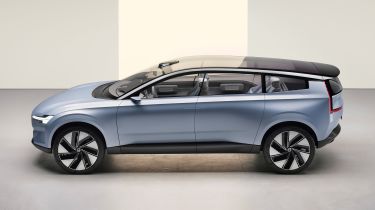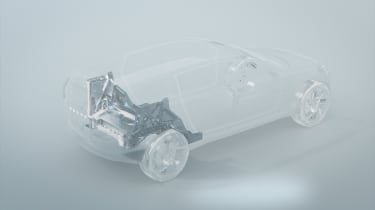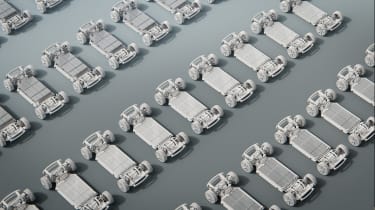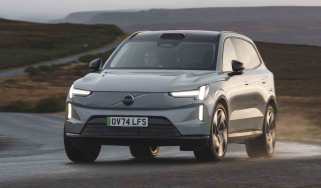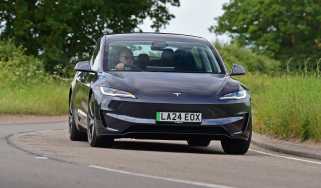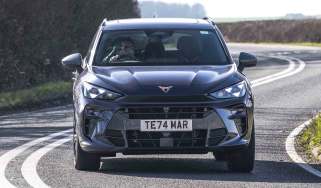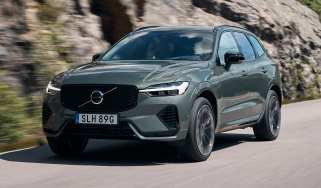Volvo plans new mega-casting technique for next-generation electric cars
Volvo's innovative one-piece castings will replace around 100 parts on the rear floor of the company’s upcoming electric cars
Volvo has confirmed that its next-generation all-electric models will make use of a new mega-casting production technique made possible by an £810 million investment in its Torslanda production facility.
The first car to feature the new technology, which could be a production version of the Concept Recharge, will be produced in 2025.
Mega-casting involves moulding a section of a vehicle with as many components built into the panel as possible, reducing complexity when it comes to main assembly. It’s utilised by Tesla’s latest car, the Model Y SUV.
Volvo plans to use the technology to create a single mega-cast aluminium floor pan. The mega-cast floor pans for Volvo’s next-generation EVs will have the mounting points for items like suspension arms and electric motors already built in, which negates the need for a rear subframe. In total, Volvo says the technology will trim around 100 parts from each car.
The upside of this is that the finished car should weigh less, thereby improving the efficiency of the electric powertrain and, in theory, allowing it to travel further before needing to be recharged. There are also packaging benefits and minor cost savings to be had along the way.
Volvo is considering ways to scale-up the technology, but the company’s engineers are waiting for the machinery to catch up with their ambition. Currently, the firm has 80,000- tonne presses ready to produce the rear floor sections.
“Replacing 100 parts with one reduces the complexity of manufacturing, so that’s one good thing,” Dr. Mikael Fermér, Volvo’s lead engineer for its mega-casting project, told Auto Express.
Volvo is also pushing its sustainability credentials to their limits, as the brand strives to become a fully electric manufacturer by 2030 – and this new technology will help trim down its emissions. Fermér said: “if we look at the CO2 emissions of producing a steel floor with a cast aluminium floor, it’s a major reduction. So that’s important also.”
Fermér then discussed cost. “We say the cost for a cast aluminium floor and a steel floor is ballpark the same,” he said, “but you always have benefits. We have a weight reduction for instance, but also one thing that I think is important is the design flexibility that you get.”
The theory is that, rather than throwing away a platform when it reaches the end of its life, Volvo’s mega-casting method would allow it to constantly update its underpinnings as technology improves, by simply tweaking elements of the mould to suit new suspension, motors and battery packs.
“You could say that it’s an architecture without an end-of-life,” said Fermér. “You can continuously update, and everything you learn, you can put into the next die or the next product.”
The system can also be used to tailor a platform to a specific car, as the effort required is only a matter of swapping out a stamping die rather than retooling an entire production line.
Fermér explained the process with an example: “Let’s say you want to produce a small B-segment vehicle,” he said. “Very simple with no electrical motor in the rear and just a simple twist beam. Very simple. Then you produce a cast floor for that one, which is totally optimised for that one.
“On the other end, you have a seven-seater with three seat rows, fully active suspension, rear wheel steering and a big electrical motor. Then you create a casting for that one. Totally optimised for that product. These two products have nothing in common and they are totally optimised for their own purpose.
“Imagine if you tried to do that on an existing platform within the bandwidth you have. It’s more or less impossible. And if you do it, there will be major penalties on one or both. So that’s kind of the view – that you can optimise much more for unique products.”
Volvo also expects its mega-cast panels will also improve the safety of its electric vehicles, especially when combined with the battery packs. Fermér was confident about the strength of the technology, saying: “We think the insurance costs will be roughly like today.
“But there is one important thing. If you compare a traditional car with a combustion engine, the floor is like a ladder frame – so, if you have a hit from behind or with an angle, you typically shear the floor a little bit and then the chassis attachment points are out of position, and then you have to pull it straight again.
“But, as soon as you put in the battery under the floor, the whole floor is so much stiffer, so the likelihood of having this skewing of the floor is almost taken away. And if, on top of that, you put the mega-casting, it’s so stiff. So we expect that kind of repairs to be reduced a lot.”
Now click here to read how Volvo plans to ditch leather in all its cars by 2030…
Find a car with the experts

